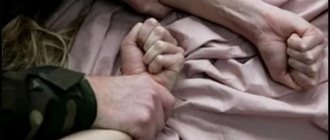New edition of Art. 97 of the Criminal Code of the Russian Federation
1. Compulsory medical measures may be imposed by a court on the following persons:
a) who committed acts provided for in the articles of the Special Part of this Code in a state of insanity;
b) who, after committing a crime, have developed a mental disorder that makes it impossible to impose or carry out punishment;
c) who have committed a crime and suffer from mental disorders that do not exclude sanity;
d) has become invalid;
e) who, at the age of over eighteen, have committed a crime against the sexual integrity of a minor under fourteen years of age, and who suffer from a disorder of sexual preference (pedophilia), which does not exclude sanity.
2. Persons specified in part one of this article are prescribed compulsory medical measures only in cases where mental disorders are associated with the possibility of these persons causing other significant harm or danger to themselves or other persons.
3. The procedure for the execution of compulsory measures of a medical nature is determined by the criminal executive legislation of the Russian Federation and other federal laws.
4. In relation to the persons specified in paragraphs “a” - “c” of part one of this article and who do not pose a danger due to their mental state, the court may transfer the necessary materials to the federal executive body in the field of healthcare or the executive body of the constituent entity of the Russian Federation in in the healthcare sector to resolve the issue of treating these persons in a medical organization providing psychiatric care, or sending these persons to inpatient social service institutions for persons suffering from mental disorders, in the manner established by legislation in the field of health care.
Lecture 18. Compulsory medical measures
1. The concept and purposes of using compulsory medical measures.
2. Types of compulsory medical measures.
1. Concept and purposes of using compulsory medical measures
Compulsory medical measures in themselves are not a criminal punishment, but nevertheless are always associated with the criminal legal consequences of a socially dangerous act committed and the conviction of the person guilty of committing it.
The purposes of applying compulsory measures of a medical nature, in contrast to the purposes of punishment, are to cure persons who have committed a socially dangerous act in a state of insanity, or who, after its commission, have developed a mental disorder that makes it impossible to assign or carry out punishment, or persons who have committed a crime and suffer from mental disorders. disorders that do not exclude sanity or improvement of their mental state, as well as preventing them from committing new acts provided for in the articles of the Special Part of the Criminal Code of the Russian Federation (Article 98 of the Criminal Code of the Russian Federation). Thus, the legislator does not link the use of compulsory medical measures with punishment and for the purpose of correcting the convicted person.
Application of compulsory medical measures in accordance with the requirements of Art. 97 of the Criminal Code of the Russian Federation, due to the following features:
a) the person committed a socially dangerous act, provided for in the articles of the Special Part of the Criminal Code, in a state of insanity;
b) the person, after committing a crime, develops a mental disorder that makes it impossible to assign and execute punishment;
c) the person who committed the crime suffers from mental disorders that do not exclude sanity;
d) the possibility of these persons causing other significant harm or there is a danger to themselves or other persons.
If the above-mentioned persons do not pose a danger due to their mental state, the court may transfer the necessary materials to the health authorities to resolve the issue of treating these persons or sending them to psychoneurological social security institutions in the manner prescribed by the legislation of the Russian Federation on health care.
Thus, compulsory medical measures are understood as measures provided for by criminal law aimed at treating persons who have committed a socially dangerous act, in relation to whom, due to their mental health, it is impossible to apply criminal liability or punishment, as well as persons suffering from mental disorders, not excluding sanity, in order to improve their mental state and prevent them from committing new acts.
2. Types of compulsory medical measures
Types of compulsory measures of a medical nature are determined by medical indications, and the court, when prescribing them, is obliged to be guided by the conclusion of a psychiatric examination. Compulsory medical measures are prescribed by the court either independently or in parallel with punishment.
Article 99 of the Criminal Code of the Russian Federation defines the following types of compulsory medical measures:
a) outpatient compulsory observation and treatment by a psychiatrist is used if the person’s mental state does not require placement in a psychiatric hospital;
b) compulsory treatment in a general psychiatric hospital may be prescribed if the nature of the person’s mental disorder requires such conditions of treatment, care, maintenance and observation that can only be carried out in a psychiatric hospital, and if the person’s mental state requires inpatient treatment and supervision, but does not require intensive supervision;
c) compulsory treatment in a specialized psychiatric hospital is prescribed to a person whose mental state requires constant monitoring;
d) compulsory treatment in a specialized psychiatric hospital with intensive supervision may be prescribed to a person whose mental state poses a particular danger to himself or other persons and requires constant and intensive supervision.
Based on the conclusion of a commission of psychiatrists, on the proposal of the administration of the institution providing compulsory treatment, the court may extend, change or terminate the application of compulsory medical measures.
A person who has been prescribed a compulsory measure of a medical nature is subject to examination by a commission of psychiatrists at least once every six months to decide whether there are grounds for making a submission to the court to terminate the application or to change such a measure. If there are no grounds for terminating the application or changing a compulsory medical measure, the administration of the institution providing compulsory treatment shall submit a conclusion to the court to extend compulsory treatment. The first extension of compulsory treatment can be made after six months from the date of commencement of treatment; thereafter, extension of compulsory treatment is carried out annually.
The change or termination of the application of a compulsory measure of a medical nature is carried out by the court in the event of such a change in the mental state of a person in which there is no need to apply a previously prescribed measure or there is a need to prescribe another compulsory measure of a medical nature.
If the application of compulsory treatment in a psychiatric hospital is terminated, the court may transfer the necessary materials in relation to the person undergoing compulsory treatment to the health authorities to resolve the issue of his treatment or referral to a psychoneurological social security institution in the manner prescribed by the legislation of the Russian Federation on health care.
If a person whose mental disorder occurred after committing a crime has recovered, then in accordance with Art. 103 of the Criminal Code of the Russian Federation, when imposing a sentence or resuming its execution, the time during which a person was subjected to compulsory treatment in a psychiatric hospital is counted towards the sentence at the rate of one day of stay in a psychiatric hospital for one day of imprisonment.
Compulsory medical measures related to the execution of punishment are applied to persons who have committed a crime and suffer from mental disorders that do not exclude sanity.
Compulsory medical measures for these persons are carried out at the place of serving imprisonment, and in relation to those sentenced to other types of punishment - in health care institutions providing outpatient psychiatric care.
If there is a change in the mental state of the convicted person requiring inpatient treatment, the placement of the convicted person in a psychiatric hospital or other medical institution is carried out in the manner and on the grounds provided for by the legislation of the Russian Federation on health care.
The duration of stay in these institutions, according to Art. 104 of the Criminal Code of the Russian Federation, is counted towards the term of serving the sentence.
Termination of the application of a compulsory medical measure combined with the execution of a sentence is carried out by the court upon the proposal of the body executing the punishment, based on the conclusion of a commission of psychiatrists.
The use of compulsory medical measures does not entail criminal legal consequences in the form of a criminal record.
1. The concept and purposes of using compulsory medical measures.
2. Types of compulsory medical measures.
1. Concept and purposes of using compulsory medical measures
Compulsory medical measures in themselves are not a criminal punishment, but nevertheless are always associated with the criminal legal consequences of a socially dangerous act committed and the conviction of the person guilty of committing it.
The purposes of applying compulsory measures of a medical nature, in contrast to the purposes of punishment, are to cure persons who have committed a socially dangerous act in a state of insanity, or who, after its commission, have developed a mental disorder that makes it impossible to assign or carry out punishment, or persons who have committed a crime and suffer from mental disorders. disorders that do not exclude sanity or improvement of their mental state, as well as preventing them from committing new acts provided for in the articles of the Special Part of the Criminal Code of the Russian Federation (Article 98 of the Criminal Code of the Russian Federation). Thus, the legislator does not link the use of compulsory medical measures with punishment and for the purpose of correcting the convicted person.
Application of compulsory medical measures in accordance with the requirements of Art. 97 of the Criminal Code of the Russian Federation, due to the following features:
a) the person committed a socially dangerous act, provided for in the articles of the Special Part of the Criminal Code, in a state of insanity;
b) the person, after committing a crime, develops a mental disorder that makes it impossible to assign and execute punishment;
c) the person who committed the crime suffers from mental disorders that do not exclude sanity;
d) the possibility of these persons causing other significant harm or there is a danger to themselves or other persons.
If the above-mentioned persons do not pose a danger due to their mental state, the court may transfer the necessary materials to the health authorities to resolve the issue of treating these persons or sending them to psychoneurological social security institutions in the manner prescribed by the legislation of the Russian Federation on health care.
Thus, compulsory medical measures are understood as measures provided for by criminal law aimed at treating persons who have committed a socially dangerous act, in relation to whom, due to their mental health, it is impossible to apply criminal liability or punishment, as well as persons suffering from mental disorders, not excluding sanity, in order to improve their mental state and prevent them from committing new acts.
2. Types of compulsory medical measures
Types of compulsory measures of a medical nature are determined by medical indications, and the court, when prescribing them, is obliged to be guided by the conclusion of a psychiatric examination. Compulsory medical measures are prescribed by the court either independently or in parallel with punishment.
Article 99 of the Criminal Code of the Russian Federation defines the following types of compulsory medical measures:
a) outpatient compulsory observation and treatment by a psychiatrist is used if the person’s mental state does not require placement in a psychiatric hospital;
b) compulsory treatment in a general psychiatric hospital may be prescribed if the nature of the person’s mental disorder requires such conditions of treatment, care, maintenance and observation that can only be carried out in a psychiatric hospital, and if the person’s mental state requires inpatient treatment and supervision, but does not require intensive supervision;
c) compulsory treatment in a specialized psychiatric hospital is prescribed to a person whose mental state requires constant monitoring;
d) compulsory treatment in a specialized psychiatric hospital with intensive supervision may be prescribed to a person whose mental state poses a particular danger to himself or other persons and requires constant and intensive supervision.
Based on the conclusion of a commission of psychiatrists, on the proposal of the administration of the institution providing compulsory treatment, the court may extend, change or terminate the application of compulsory medical measures.
A person who has been prescribed a compulsory measure of a medical nature is subject to examination by a commission of psychiatrists at least once every six months to decide whether there are grounds for making a submission to the court to terminate the application or to change such a measure. If there are no grounds for terminating the application or changing a compulsory medical measure, the administration of the institution providing compulsory treatment shall submit a conclusion to the court to extend compulsory treatment. The first extension of compulsory treatment can be made after six months from the date of commencement of treatment; thereafter, extension of compulsory treatment is carried out annually.
The change or termination of the application of a compulsory measure of a medical nature is carried out by the court in the event of such a change in the mental state of a person in which there is no need to apply a previously prescribed measure or there is a need to prescribe another compulsory measure of a medical nature.
If the application of compulsory treatment in a psychiatric hospital is terminated, the court may transfer the necessary materials in relation to the person undergoing compulsory treatment to the health authorities to resolve the issue of his treatment or referral to a psychoneurological social security institution in the manner prescribed by the legislation of the Russian Federation on health care.
If a person whose mental disorder occurred after committing a crime has recovered, then in accordance with Art. 103 of the Criminal Code of the Russian Federation, when imposing a sentence or resuming its execution, the time during which a person was subjected to compulsory treatment in a psychiatric hospital is counted towards the sentence at the rate of one day of stay in a psychiatric hospital for one day of imprisonment.
Compulsory medical measures related to the execution of punishment are applied to persons who have committed a crime and suffer from mental disorders that do not exclude sanity.
Compulsory medical measures for these persons are carried out at the place of serving imprisonment, and in relation to those sentenced to other types of punishment - in health care institutions providing outpatient psychiatric care.
If there is a change in the mental state of the convicted person requiring inpatient treatment, the placement of the convicted person in a psychiatric hospital or other medical institution is carried out in the manner and on the grounds provided for by the legislation of the Russian Federation on health care.
The duration of stay in these institutions, according to Art. 104 of the Criminal Code of the Russian Federation, is counted towards the term of serving the sentence.
Termination of the application of a compulsory medical measure combined with the execution of a sentence is carried out by the court upon the proposal of the body executing the punishment, based on the conclusion of a commission of psychiatrists.
The use of compulsory medical measures does not entail criminal legal consequences in the form of a criminal record.
Judicial practice under Article 101 of the Criminal Code of the Russian Federation
Determination of the Judicial Collegium for Administrative Cases of the Supreme Court of the Russian Federation dated October 19, 2018 N 74-KG18-8
By virtue of paragraph “c” of Part 1 of the Article and Part 3 of Article 101 of the Criminal Code of the Russian Federation, compulsory treatment in a medical organization providing psychiatric care in an inpatient setting, a specialized type can be prescribed to a person whose mental state requires constant monitoring.
Appeal ruling of the Judicial Collegium for Criminal Cases of the Supreme Court of the Russian Federation dated May 19, 2021 N 88-APU21-1
Based on this rule of law, Kalinin E.S. subject to release from the punishment imposed on him with the application of a compulsory measure of a medical nature to him, the type of which is determined on the basis of Art. Art. and 101 of the Criminal Code of the Russian Federation, taking into account the conclusions of expert psychiatrists. Based on the aforesaid and guided by Article. Art. 389, 389, 389 Code of Criminal Procedure of the Russian Federation, Judicial Collegium
Determination of the Constitutional Court of the Russian Federation dated September 27, 2019 N 2376-O
The provisions contested by the applicant regulate the grounds for the use and types of compulsory measures of a medical nature, cases in which compulsory treatment is prescribed in a medical organization providing psychiatric care in inpatient conditions, issues of extension, modification and termination of compulsory measures of a medical nature (Articles , , 101 and 102 of the Criminal Code of the Russian Federation). Federation and Article 445 of the Code of Criminal Procedure of the Russian Federation), issues of recognizing a citizen as incompetent and the procedure for considering an application for recognition as incompetent (Article 29 of the Civil Code of the Russian Federation and Article 284 of the Code of Civil Procedure of the Russian Federation), establish the judicial procedure for considering complaints and the categories of persons in respect of whom a special procedure is applied in criminal cases (Articles 125 and 447 of the Code of Criminal Procedure of the Russian Federation), specify guarantees of the immunity of judges (Article 16 of the Law of the Russian Federation “On the status of judges in the Russian Federation”), define the duties of an expert (Article 16 of the Federal Law “On State Forensic Expert Activities in the Russian Federation”) Federation"), and also establish criminal liability for refusal to provide information to the Federal Assembly of the Russian Federation or the Accounts Chamber of the Russian Federation (Article 287 of the Criminal Code of the Russian Federation).
Special court decisions regarding certain categories of accused
In relation to certain categories of accused, the court may make special decisions regarding the application of measures in the form of compulsory treatment to the offender. First of all, the law identifies in a special category of criminals those criminals who, as adults, committed a crime affecting the sexual safety of minors (pedophilia).
Thus, if, at the end of a regular medical examination, the attending physician comes to the conclusion that the criminal no longer needs treatment, the court, acting on its own conviction and in accordance with the law, makes a special decision by which such a criminal will be assigned a forensic psychiatric examination. The same examination will be ordered in relation to this category of criminals if the criminal has received the right to terminate serving his sentence on parole.
A special court ruling in relation to a certain category of criminals may even establish the obligation to apply additional medical measures even after the parole of such a criminal, obliging him to regularly visit a psychiatrist or undergo other treatment measures.
In addition, Article 102 of the Criminal Code of the Russian Federation in part 4 establishes other features of compulsory treatment established for certain categories of criminals.
Thus, in order to control a criminal who has served his sentence, the court has the right to transfer the materials of his medical history to the bodies of the subject for the execution of punishments in order to regularly monitor the mental state of the released criminal and prevent him from committing new crimes.






